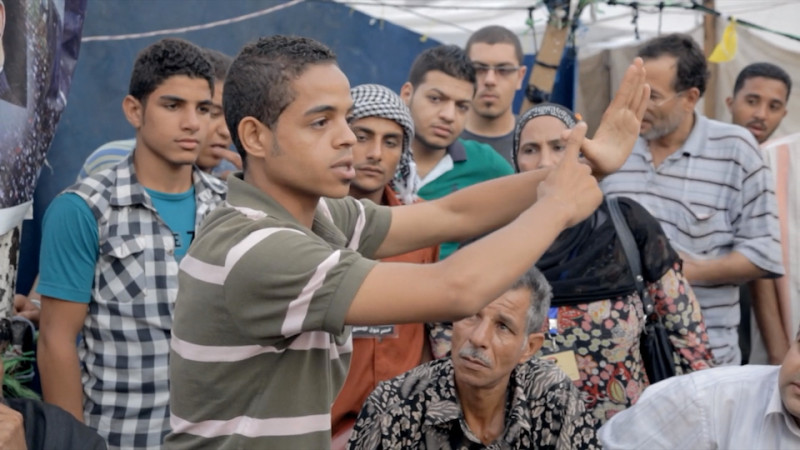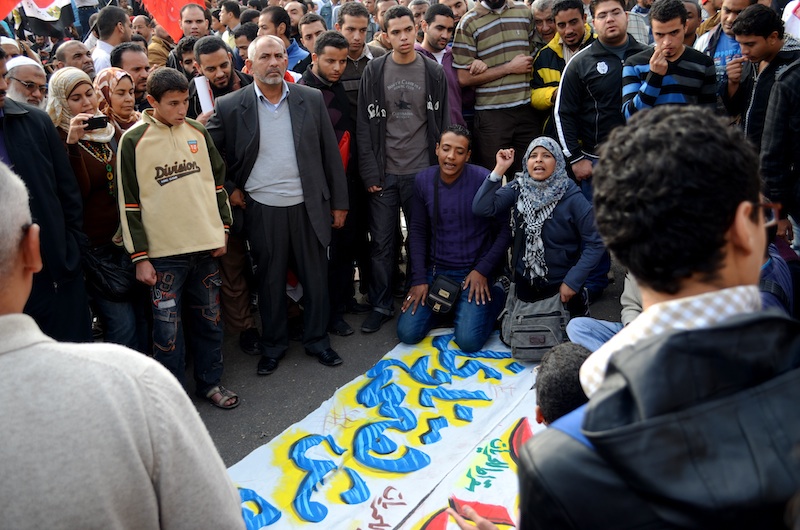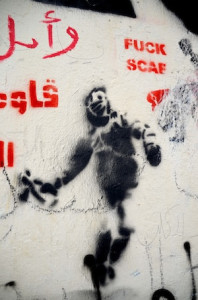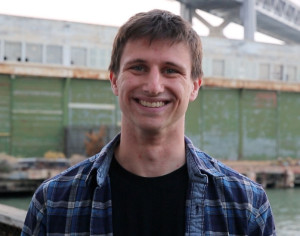
Scene from The Square in which Ahmed Hassan (center),
a young Egyptian activist, speaks to fellow protestors.
Netflix/Noujaim Films
Note from the Editors: Along with The Act of Killing, Cutie and the Boxer, Dirty Wars, and 20 Feet from Stardom, The Square is nominated for Best Documentary Feature. In anticipation of the Oscars, we asked Alex Mayyasi, co-author with Ahmed Salah of “The Spark: Starting the Revolution” (published here in the fall), for his thoughts on The Square. The 86th Academy Awards ceremony airs tomorrow night.
Jehane Noujaim, the director of the The Square (Al Midan), has won nothing but accolades abroad and nothing but ire from Egyptians for her new documentary about the Egyptian Revolution. Given the fractured state of Egyptian society, it would be impossible to please everyone. But it is perhaps an accomplishment that its subjects nearly universally criticize it.
This is not to say that the film’s Oscar nomination is undeserved, nor that it misleads. Noujaim and her crew do an admirable job sketching out the never-ending story of Egypt’s Revolution for a foreign audience that likely lost the thread over its three-year course.
The movie begins with Ahmed Hassan, a young, gregarious protester, describing the poverty and indignities of life under President Hosni Mubarak. “Egypt was living without dignity. Injustice existed everywhere,” he narrates with a revolutionary’s subtlety. “I lived from one job to the next. I started working when I was eight years old.”
Hassan provides voice-over for a retrospective on the 2011 protests that led to Mubarak’s resignation after a three-decade dictatorial reign. He continues to narrate, but the film introduces a handful of additional characters – mostly young, liberal activists, but also one member of the Muslim Brotherhood, the well-organized social and political movement – whom viewers follow through three more years of protests and elections: the demonstrations against the military caretaker government; the referendums, parliamentary, and presidential elections that divide the revolutionary forces and bring the Muslim Brotherhood into power; and protests in turn against the new Muslim Brotherhood government.
Noujaim and her team began screening an early version of the film, which ended with the anti-Brotherhood protests, in the spring of 2013. But they returned to Cairo when the demonstrations felled the Muslim Brotherhood government. The team continued to film, and the finished version of The Square, now available on Netflix, also covers the newly empowered military’s crackdown on the Brotherhood – naming it a terrorist organization – and subsequent protests against the military.
It’s a complicated plot. Throughout, each twist and turn is framed with a pause in the action. Onscreen text displays the date and sets up the next events in the narrative in front of the lush backdrop of the political graffiti and murals that filled downtown Cairo when the revolution began. The film is at its best, though, when capturing human moments of a story that has filled newspapers for so long that it has lost its visceral feel. Images of protesters standing all night, rocks in hand and wary of a police raid, replace headlines about the continued occupation of Tahrir Square, the focal point of Cairo’s protests. Viewers see activists filming a friend’s bruised back to upload evidence of police brutality onto YouTube. Shots of tanks running over civilians and security forces dragging dead bodies onto piles of trash bring life to the word “crackdown.” A weeping mother talking to her martyred son’s comrades stands in for reported death tolls.
In Egypt, where the government controls which movies appear in theaters, The Square has not been officially released. But where it has been screened privately, the response has been contentious.
A New York Times article chronicled some of the reactions. Members of the Muslim Brotherhood complain that the film ignores the deaths of their members at the military’s hands. Liberals deride The Square’s lack of attention to the pharaonic actions of Mohamed Morsi, the Muslim Brotherhood’s deposed president, during his reign. Novelist Alaa Al Aswany chides Noujaim for giving voice only to several young, educated activists and ignoring “the masses of simple people.” The military and supporters call the documentary anti-Egyptian propaganda created by the United States.

Protestors gather in Tahrir Square in 2012.
Credit: Alex Mayyasi
When I spoke with Ahmed Salah, a prominent Egyptian activist and friend, he began recalling his complaints before composing himself and telling me, “It is good for Western audiences, at least. It shows why we fight the military.” When I pushed him, he replied, “I am trying not to stress. For my health. So it’s okay.”
To eyes trained in the divisions of Egypt’s politically active forces, even the most innocuous details in The Square become fodder for criticism. As an American who worked with Egyptian activists in Cairo for eight months from 2011 to 2012, I began to pick them out.
An early scene shows a YouTube video of a young Egyptian activist named Asmaa Mahfouz encouraging Egyptians to go to Tahrir Square on January 25, 2011. It’s a historical record of the sentiments that drove Cairenes to protest, and its inclusion could be explained due to the fact that it is an easily accessed archive from a time before The Square began filming.
Within the community of activists who were active before the 2011 revolution, however, it’s a sore spot. A fault line divides the “keyboard activists,” noted for their blogging and use of social media, from the street activists who occupied physical spaces and created human networks of protesters. International media glorified the keyboard activists and played up the role of the Internet in sparking the revolution – to the exasperation of street activists who retort that few Egyptians use the Internet, and even fewer use it for politics. While The Square makes no explicit comment while showing the video, its mere presence draws the indignation of street activists who are tired of this narrative.
It’s impossible to comprehend the divisiveness of The Square among Egyptians – or the problems that have bedeviled Egypt since the fall of Mubarak in 2011 – without understanding the ubiquitous use of the word “traitor.” During his rule, Mubarak claimed to be defending the country from American-Israeli plots. When protests denounced him, he named the activists foreign agents and traitors. It’s a tradition that Egypt has kept. By the time I arrived in Cairo, nine months after the fall of Mubarak, Ahmed Salah showed me a newspaper denouncing him and distinguished Egyptian diplomat Mohamed El Baradei as traitors – a complaint echoed by the more liberal activists profiled in The Square.

Graffiti on a wall near Tahrir Square, 2012. (The Supreme Council of the Armed Forces took power after Mubarak left office in February 2011.)
Credit: Alex Mayyasi 2012
Not only does the accusation of treason and betrayal cross the major fault lines of the military, Muslim Brotherhood, and revolutionary protesters. It’s also ammunition in internecine battles. Members of liberal protest movements have lobbed it against each other as they fight for control of their organizations; the Muslim Brotherhood levies the charge against Islamist groups that communicate with the current military government. It’s on the lips of the politicians of various political parties.
Although it’s less well known, Egypt first inspired the Middle East with its activism in 2004-2005, when the Egyptian Movement for Change (also known as Kefaya! Or Enough!) became the first political movement in the Middle East based on independent membership rather than political parties. Its rallies against the Mubarak government were the first in years. But its real triumph was to unite Egypt’s warring opposition parties behind the demand of Mubarak’s resignation and meaningful elections. Kefaya lost its prominence when the regime violently stifled its ability to assemble in public, but not before its own unity crumbled as its members fought and denounced each other during parliamentary elections held in 2006.
History repeats itself in The Square, as the 2012 elections produce the same schisms. A major theme is the disappearance of the unity evident during the original seventeen days of the revolution, when Christians stood around Muslims in Tahrir Square to protect them as they prayed and liberals and Islamists fought together. As elections begin, the fight for political power ends the brief moment of unanimity. Khalid Abdalla, one of The Square’s featured activists who starred in the film The Kite Runner, reflected in an interview that the documentary’s success was in capturing that brief “moment of extraordinary solidarity.”
In November of 2011, nearly a year after the fall of Hosni Mubarak, I sat on the steps to the Syndicate of Journalists. Located in downtown Cairo, it’s a hotbed of activism where protesters rallied in the mid 2000s when occupying Tahrir was still a pipe dream.
As a friend translated, an activist on the steps related a parable. He told me that during a battle early in the years of Islam, the Prophet Mohammed told a large group to stay in the back to guard the army’s rear. But as victory appeared imminent, this vanguard rushed forward to gain part of the glory, leaving the army vulnerable. The people that left Tahrir Square so quickly, he said, are like that vanguard. And we will all pay the price.
The man wore dirty trainers, chainsmoked, and wore a shirt three sizes too big for him. It was the most eloquent analysis of the post-revolution situation that I had heard.
The Square does a beautiful job of telling this story through the experiences of one group of friends and activists. The full cast of the revolution will not all agree. But as Egyptians fight for control of the narrative of the revolution, the idea of a documentary that pleases all Egyptians is as elusive as a happy ending to Egypt’s never-ending revolution.
 Alex Mayyasi is a writer in San Francisco and the co-founder, with Ahmed Salah, of the Activism Research Center. He is a graduate of Stanford University’s International Relations program, where was a former editor and contributor to The Claw Magazine. From 2011 to 2012 he lived in Cairo, and worked for a local non-governmental organization supporting human rights and civil society through the use of new media.
Alex Mayyasi is a writer in San Francisco and the co-founder, with Ahmed Salah, of the Activism Research Center. He is a graduate of Stanford University’s International Relations program, where was a former editor and contributor to The Claw Magazine. From 2011 to 2012 he lived in Cairo, and worked for a local non-governmental organization supporting human rights and civil society through the use of new media.
